Kathmandu: The inaugural Himalaya Shumsher Memorial Lecture, organized by the Nepal Rastra Bank (NRB), explored the evolving role of central banks in the modern economic landscape. The event honored Himalaya Shumsher Rana, the NRB’s first governor, who played a crucial role in shaping Nepal’s financial systems from 1956 to 1961.
A senior official from the Reserve Bank of India delivered the keynote address, emphasizing the long-standing and cooperative relationship between Nepal and India. This partnership has been mutually beneficial, particularly as central banks transition from focusing solely on price stability to encompassing broader mandates that include financial stability and economic growth. Recent global challenges, including the COVID-19 pandemic, rising inflation, and geopolitical tensions, have accelerated this shift.
The speaker highlighted the interconnectedness of price and financial stability, arguing that both must be considered in tandem to effectively address future crises. The lecture also pointed out the expanded toolkits of central banks, which now utilize both conventional and unconventional policy measures. A notable shift in central bank communication was discussed, with an emphasis on transparency over the previously secretive nature of operations.
Emerging challenges such as climate change, geopolitical fragmentation, and rapid technological advancements were also addressed. The rise of fintech and artificial intelligence brings both opportunities and risks, necessitating careful regulation to maintain stability within the financial system.
In concluding remarks, the speaker reflected on lessons learned from past crises, advocating for proactive and innovative policymaking. He cited the resilience of the Indian economy amidst recent global shocks as evidence of the effectiveness of strategic measures implemented by the Reserve Bank of India. The lecture underscored the necessity for central banks to remain adaptable and forward-thinking to ensure economic stability in an increasingly complex world.
